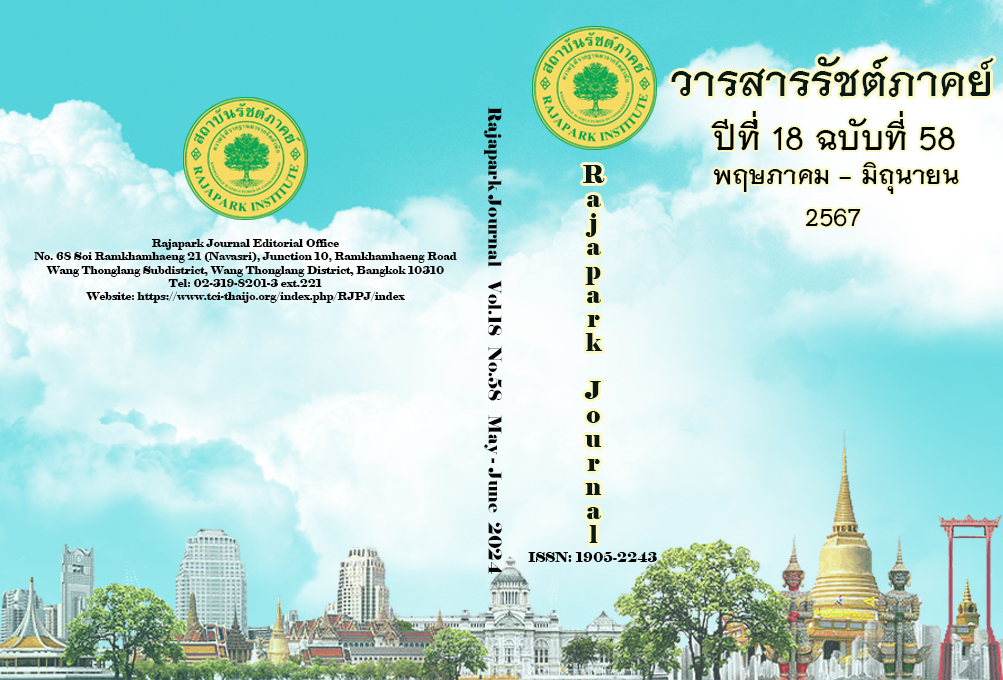Guidelines for Developing Teacher Competency in the 21st Century of Schools Under the Secondary Educational Service Area Office, Mukdahan
Main Article Content
Abstract
Rapid changes in the world are caused by advanced and modern technology. Teachers need to have the necessary abilities and competencies so that learning management can develop students to their fullest potential. The purposes of this research were (1) to study the current and desired situations of teacher competency in the 21st century; (2) to study the priority needs of teachers operating systems in the 21st century; (3) to develop guidelines for developing teacher competencies in the 21st century; and (4) to evaluate the suitability and feasibility of the guidelines for developing teacher competencies in the 21st century. The sample group consisted of 252 people. The sample size was determined using percentage criteria. The instruments for collecting data were (1) a questionnaire about current and desired situations, (2) a structured interview form, and (3) the propriety and possibility assessment of the guidelines for developing teacher competencies in the 21st century. The statistics employed in data analysis were percentage, mean, standard deviation, and Modified Priority Needs Index (PNI Modified). The research results revealed that (1) the overall current situations for participating in the promotion of teacher competency in the 21st century were at a high level, and the overall desirable situations were at the highest level. (2) The needs that were higher than the overall average included topics of Evaluation and Research, Teamwork and Knowledge sharing, Technology and Educational Innovation, Communication, and Curriculum and Learning management. (3) The development guidelines consisted of seven components, for a total of 36 development guidelines. (4) The results of the overall development evaluation revealed that suitability was at the highest level and possibility was at the highest level.
Article Details

This work is licensed under a Creative Commons Attribution-NonCommercial-NoDerivatives 4.0 International License.
Views and opinions appearing in the Journal it is the responsibility of the author of the article, and does not constitute the view and responsibility of the editorial team.
References
Aksorn. (n.d.). 21st-Century Skill: When skills in the old world, Not enough anymore. https://www.aksorn.com/en/21st-century-skills
Angnoi, T., & Konpuang, A. (2021). Competencies Development Model of Novice Teacher in 21st Century Based on School as Learning Organization. Journal of Education Naresuan University, 23(2), 169-180. https://so06.tci-thaijo.org/index.php/edujournal_nu/article/view/221050
Areeraksakul-Konglok, S. (2018). Teacher subject matter collection, Unit 10. Sukhothai Thammathirat Open University.
Banjongkan, S. (2020) Guidelines for developing teachers' learning management competencies in the 21st century, Piboon Prachasan School. https://www.pbps.ac.th/wp/?p=2394
Boonkan, D. (2020). The Needs for developing teacher competency in the 21st century in the schools in the 3rd Co-campus, Prayai Khueangnai Under the Office of the Secondary Educational Service Area 29, Journal of Educational Innovation and Research, 4(3),
–357. https://so03.tci-thaijo.org/index.php/jeir/article/view/247456
Chomphukam, P. (2019). Evaluation Model of Pre-Service Teachers Competency in the 21st Century. Journal of Educational Research Faculty of Education Srinakharinwirot University, 14(1), 105–121. https://ejournals.swu.ac.th/index.php/jre/article/view/11825
Intala, S., & Vaisopha, K. (2023). Study of Competency of Teachers in 21st Century Under Loei Primary Education Service Area Office 1. Ratanabuth Journal, 5(1), 228-239. https://so07.tci-thaijo.org/index.php/rtnb/article/view/2533
Kanpuwanan K., & Uthairat W. (2019). A 21st Century Learning Management Performance Development Model for Teachers in Extra-Large Secondary Schools under the Office of the Basic Education Commission. Journal of Education Studies, Chulalongkorn University, 47(1), 1-17. http://eresource.car.chula.ac.th/chula-ejournals/openpdf/openpdf.php?id=2918
Laohajaratsaeng, T. (2013). The future of Thai teachers: C-Teacher. Information Technology Service Center, Chiang Mai University.
Meesamsan, K. (2017). Guidelines for developing competency in learning management of early childhood teachers in the 21st century. Valaya Alongkorn Review Journal (Humanities and Social Sciences), 7(2), 45-57.
Narasri, P. (2021). Guidelines for developing skills in the 21st century for primary school teachers in Saraburi Province[Master’s Thesis, Rajamangala University of Technology Thanyaburi].
Office of the Basic Education Council. (2018). Developing a mechanism to drive the production and development system of high-performance teachers for Thailand 4.0. Phrikwan Graphic.
Office of the Basic Educational Commission. (2011). Teacher competency assessment manual (revised edition). Office of Teacher and Basic Education Personnel Development.
Panich, W. (2012). Ways to create learning for students in the 21st century. Sodsri-Saritwong Foundation.
Phuchani, W., Suwannatri, W., & Pawabutra, C. (2021). The Development of Teacher Competency on Learning Management in 21st Century: A Case Study of Ban Natatan Khamkha School. Academic and Research Journals Northeastern University, 11(3), 155-169.
Prasitsinchai, N. (2012). Development of an integrated model for developing teachers' professional competencies with participatory supervision[Doctoral dissertation, Khon Kaen University].
Saidi, A., Boonhan, S., & Thamathes, J. (2019). Competency of PE Teachers in the 21st Century. e-Journal of Education Studies, Burapha University, 1(4), 14-24. file:///C:/Users/HP/Downloads/6518-Article%20Text-7729-1-10-20191209.pdf
Sinlarat, P. (2013). Revealing 6 obstacles to working as a Thai teacher: teaching hard, lacking spirit, spirit, and lacking ICT skills. http://www.enn.co.th/5942.
Srisa-ard, B. (2017). Preliminary Research (9th ed.). Suviriyasan.
Suknaisith, A., & Kampan, A. (2017). Needs Assessment of Teacher Competency Development in the 21st Century. Journal of Social Science, Srinakharinwirot University, 20, 342-354. https://ejournals.swu.ac.th/index.php/JOS/article/view/9523
Tantichuwet, P. (2017). Generation Alpha: the new generation in Thai society in the 21st century. Chulalongkorn University.
Udomphol, B., Phramaha Sombut Tanapunyo., & Ruangsanka, R. (2020). Development of a Model for Enhancing the Competency of Buddhist Integrative Teacherhood of Students Teachers in Faculty of Education, Rajabhat University. Journal of Development Management Research, 10(2), 36-55. https://so03.tci-thaijo.org/index.php/jrcd/article/view/240189
UNESCO. (2011). UNESCO ICT Competency Framework for Teacher. https://iite.unesco.org/pics/publications/en/files/3214694.pdf
Wangmeejongmee, C. (2017). Competencies of Thai teachers in the 21st century: Adjust learning, change competencies. Journal of the Institute of Supplementary Education and Human Resources, Thammasat University, 12(2), 47-63.
Wasi, P. (2014). The learning reform: Towards a turning point in Thailand. Mata Company.
Whitehead, A. N. (1967). The aims of education and other essay. The Free Press.


